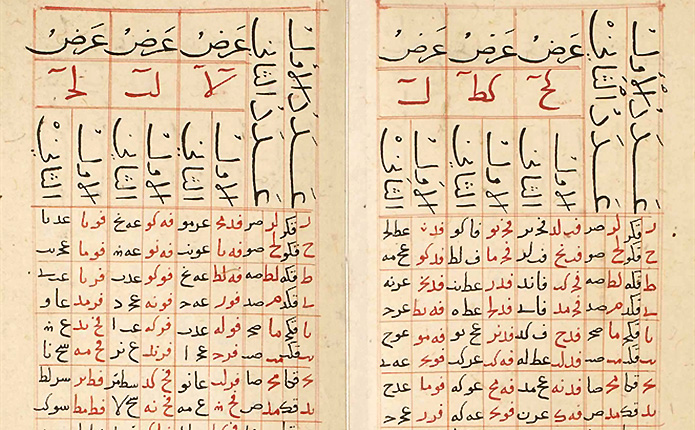Shams al-Din Abu Abd Allah al-Khalili on:
[Wikipedia]
[Google]
[Amazon]
 Shams al-Dīn Abū ʿAbd Allāh Muḥammad ibn Muḥammad al-Khalīlī ( ar, شمس الدين عبد الله محمد بن محمد الخليلي ; 1320–1380) was a
Shams al-Dīn Abū ʿAbd Allāh Muḥammad ibn Muḥammad al-Khalīlī ( ar, شمس الدين عبد الله محمد بن محمد الخليلي ; 1320–1380) was a
PDF version
* * *Denis Roegel: An Extension of Al-Khalīlī's Qibla Table to the Entire World, 2008, INRIA technical report inria-00336090 (available on http://locomat.loria.fr) 1320 births 1380 deaths People from Damascus Medieval Syrian astronomers Medieval Syrian mathematicians Scientists who worked on qibla determination 14th-century astronomers 14th-century astrologers Scholars from the Mamluk Sultanate 14th-century Arabs 14th-century Syrian people {{Scientist-stub
 Shams al-Dīn Abū ʿAbd Allāh Muḥammad ibn Muḥammad al-Khalīlī ( ar, شمس الدين عبد الله محمد بن محمد الخليلي ; 1320–1380) was a
Shams al-Dīn Abū ʿAbd Allāh Muḥammad ibn Muḥammad al-Khalīlī ( ar, شمس الدين عبد الله محمد بن محمد الخليلي ; 1320–1380) was a Mamluk
Mamluk ( ar, مملوك, mamlūk (singular), , ''mamālīk'' (plural), translated as "one who is owned", meaning " slave", also transliterated as ''Mameluke'', ''mamluq'', ''mamluke'', ''mameluk'', ''mameluke'', ''mamaluke'', or ''marmeluke'') ...
-era Syrian
Syrians ( ar, سُورِيُّون, ''Sūriyyīn'') are an Eastern Mediterranean ethnic group indigenous to the Levant. They share common Levantine Semitic roots. The cultural and linguistic heritage of the Syrian people is a blend of both indi ...
astronomer who compiled extensive tables for astronomical use. He worked for most of his life as a religious timekeeper (''muwaqqit
In the history of Islam, a ''muwaqqit'' ( ar, مُوَقَّت, more rarely ''mīqātī'') was an astronomer tasked with the timekeeping and the regulation of prayer times in an Islamic institution like a mosque or a madrasa. Unlike the mu ...
'') at the Umayyad Mosque
The Umayyad Mosque ( ar, الجامع الأموي, al-Jāmiʿ al-Umawī), also known as the Great Mosque of Damascus ( ar, الجامع الدمشق, al-Jāmiʿ al-Damishq), located in the old city of Damascus, the capital of Syria, is one of the ...
in Damascus
)), is an adjective which means "spacious".
, motto =
, image_flag = Flag of Damascus.svg
, image_seal = Emblem of Damascus.svg
, seal_type = Seal
, map_caption =
, ...
. Little else is known about his life.
Work
Al-Khalili is known for two sets of mathematical tables he constructed, both totaling roughly 30,000 entries. He tabulated all the entries made by the celebrated Egyptian Muslim astronomerIbn Yunus
Abu al-Hasan 'Ali ibn 'Abd al-Rahman ibn Ahmad ibn Yunus al-Sadafi al-Misri (Arabic: ابن يونس; c. 950 – 1009) was an important Egyptian astronomer and mathematician, whose works are noted for being ahead of their time, having been based ...
, except for the entries that al-Khalili made himself for the city of Damascus. He computed 13,000 entries into his 'Universal Tables' of different auxiliary functions which allowed him to generate the solutions of standard problems of spherical astronomy
Spherical astronomy, or positional astronomy, is a branch of observational astronomy used to locate astronomical objects on the celestial sphere, as seen at a particular date, time, and location on Earth. It relies on the mathematical methods of ...
for any given latitude. In addition to this, he created a 3,000 entry table that gave the direction of the city of Mecca
Mecca (; officially Makkah al-Mukarramah, commonly shortened to Makkah ()) is a city and administrative center of the Mecca Province of Saudi Arabia, and the holiest city in Islam. It is inland from Jeddah on the Red Sea, in a narrow v ...
(the Qibla
The qibla ( ar, قِبْلَة, links=no, lit=direction, translit=qiblah) is the direction towards the Kaaba in the Sacred Mosque in Mecca, which is used by Muslims in various religious contexts, particularly the direction of prayer for the ...
) for all latitudes and longitudes for all the Muslim countries of the 14th century. Knowledge of the direction of the Qibla is essential in Islam because Muslims pray in the direction of Mecca. The values present in al-Khalili’s tables have been determined to be accurate up to three or four significant decimal digits. Up to the present time, it is not known how exactly al-Khalili went about calculating each of his entries.G Van Brummelen (1991). "The numerical structure of al-Khalili's auxiliary tables", ''Rivista Internazionale di Storia della Scienza (N.S.)'' 28(3), pp. 667-697.
References
Further reading
*PDF version
* * *Denis Roegel: An Extension of Al-Khalīlī's Qibla Table to the Entire World, 2008, INRIA technical report inria-00336090 (available on http://locomat.loria.fr) 1320 births 1380 deaths People from Damascus Medieval Syrian astronomers Medieval Syrian mathematicians Scientists who worked on qibla determination 14th-century astronomers 14th-century astrologers Scholars from the Mamluk Sultanate 14th-century Arabs 14th-century Syrian people {{Scientist-stub